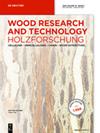A comparative study of the cell wall level delignification behaviour of four Nordic hardwoods during kraft pulping
IF 1.6
3区 农林科学
Q2 FORESTRY
引用次数: 0
Abstract
Wood is a heterogeneous material with significant variation among species. This inherent complexity poses a challenge to the continuous expansion of our understanding of the kraft process; yet previous pulping research has mainly been limited to a few species. This study investigates variations among some less studied species and their cell wall level delignification behaviour during kraft pulping. Ground wood of birch, beech, aspen, and alder were pulped at near-constant composition and temperature conditions. Minor, yet significant, differences in the rates of their delignification were observed: aspen had a pronounced fast rate during the initial stage, whereas alder delignified more slowly relative to its high initial lignin content. The dissolution of xylan was substantially faster for birch. In contrast, no substantial differences were detected between the species in the molecular weight and structure of the dissolved wood components, suggesting that the different delignification behaviours stem from variations in the residual phase. The molecular weight distribution of dissolved lignin was uniform during the initial stage of pulping, which is indicative of rapid and extensive fragmentation. Subsequently, the weight increased continuously for the remainder of the process, suggesting that the mass transfer within the cell wall influenced the overall delignification kinetics.牛皮纸制浆过程中四种北欧硬木细胞壁层脱木质素行为的比较研究
木材是一种异质材料,不同树种之间存在显著差异。这种固有的复杂性对我们不断扩大对牛皮纸工艺的了解提出了挑战;然而,以往的制浆研究主要局限于少数几个树种。本研究调查了一些研究较少的树种之间的差异,以及它们在牛皮纸制浆过程中的细胞壁层脱木质素行为。在近乎恒定的成分和温度条件下,对桦木、山毛榉、杨木和桤木的碎木进行了制浆。观察发现,它们的木质素分解速率存在微小但显著的差异:杨木在初始阶段的速率明显较快,而桤木由于初始木质素含量较高,因此木质素分解速度较慢。桦木的木聚糖溶解速度要快得多。与此相反,在溶解木材成分的分子量和结构方面,没有发现不同物种之间存在实质性差异,这表明不同的木质素分解行为源于残留相的变化。在制浆的初始阶段,溶解木质素的分子量分布是均匀的,这表明木质素被迅速而广泛地破碎。随后,在剩余的制浆过程中,木质素的重量不断增加,这表明细胞壁内的质量传递影响了整个脱木素动力学。
本文章由计算机程序翻译,如有差异,请以英文原文为准。
求助全文
约1分钟内获得全文
求助全文
来源期刊

Holzforschung
工程技术-材料科学:纸与木材
CiteScore
4.60
自引率
4.20%
发文量
83
审稿时长
3.3 months
期刊介绍:
Holzforschung is an international scholarly journal that publishes cutting-edge research on the biology, chemistry, physics and technology of wood and wood components. High quality papers about biotechnology and tree genetics are also welcome. Rated year after year as one of the top scientific journals in the category of Pulp and Paper (ISI Journal Citation Index), Holzforschung represents innovative, high quality basic and applied research. The German title reflects the journal''s origins in a long scientific tradition, but all articles are published in English to stimulate and promote cooperation between experts all over the world. Ahead-of-print publishing ensures fastest possible knowledge transfer.
 求助内容:
求助内容: 应助结果提醒方式:
应助结果提醒方式:


